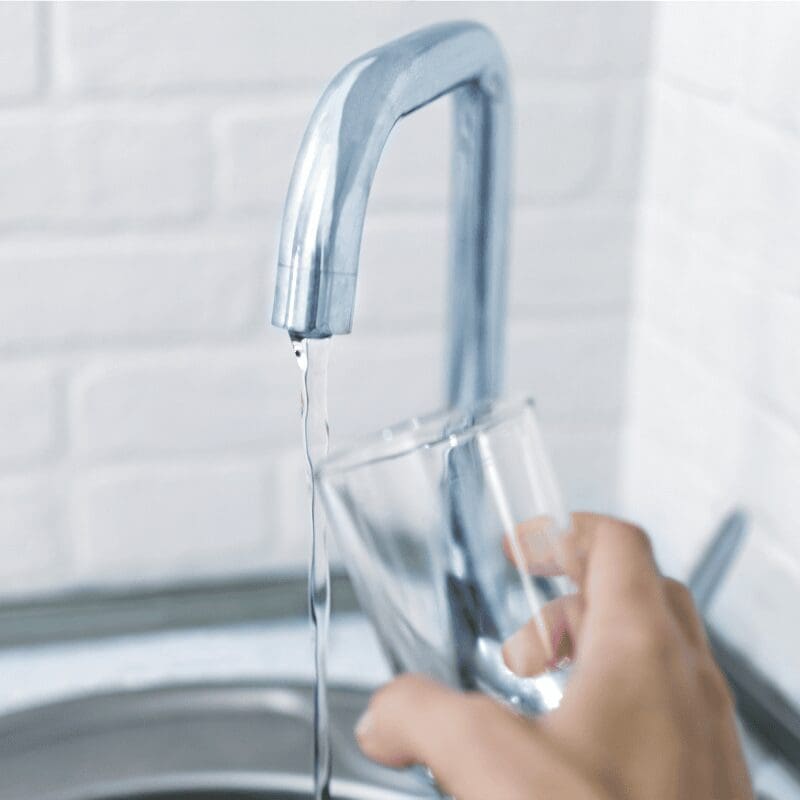Is Fluoride in Our Drinking Water Still Necessary?

For many years, fluoride has been added to the drinking water of Northern Indiana residents to reduce tooth decay, especially in children. It was first introduced in the early 20th century and quickly became a popular way to improve public health. In fact, our neighbors in Grand Rapids, MI, were the first to add fluoride to its water supply in 1945.
Today, however, there is some controversy over whether or not fluoride is still necessary in our drinking water. Some people even view fluoride as harmful and unnecessary. And since we’re in the business of filtering out the “bad” stuff from your drinking water, Office H2O thought it only fitting that we discuss whether or not fluoride is still necessary.
Why Fluoride Was Introduced in the First Place
Fluoride was added to drinking water in the early 20th century after studies showed that it could help prevent tooth decay. It was also put in toothpaste and mouthwash to further strengthen teeth. In northern Indiana, fluoride has been added to the tap water in areas such as South Bend, Plymouth, Elkhart, and Goshen since the 1960s. This decision was made by local officials who recognized the importance of dental health in their communities.
Despite the benefits of fluoride in preventing tooth decay, some people question whether it’s still necessary today. After all, dental care has improved significantly over the years, and many people use fluoride toothpaste and mouthwash regularly. Additionally, some argue that ingesting too much fluoride can be harmful. They point to research that suggests that too much fluoride can lead to dental fluorosis, a condition that can cause white or brown spots on teeth.
However, many experts believe that fluoride is still necessary in our drinking water. Here are five reasons why:
- Not all people have access to dental care.
While dental care has improved, not everyone has equal access to it. Adding fluoride to drinking water helps ensure that everyone has some level of protection against tooth decay. - Fluoride is effective.
Studies have consistently shown that fluoride is effective in preventing tooth decay. It’s a low-cost, high-impact way to improve dental health. - Low levels of fluoride are safe.
The amount of fluoride added to drinking water is carefully controlled and monitored. It’s not enough to cause harm. - Many products contain fluoride.
While it’s true that many toothpaste and mouthwash products contain fluoride, not everyone uses them regularly. Having fluoride in drinking water ensures that everyone is getting some level of protection. - Fluoride doesn’t just benefit kids.
While children are often the focus of fluoride efforts, adults benefit from fluoride as well. It can help prevent issues such as gum disease and tooth loss.

Despite these arguments, there are also good reasons to be cautious about fluoride in drinking water. Here are a few:
- Fluoride can be harmful in high doses.
While low levels of fluoride are safe, too much can be harmful. It can cause a range of health issues, including tooth decay, bone damage, and digestive issues. - Fluoride can be difficult to remove.
If you’re concerned about fluoride in your drinking water, it can be difficult to remove. Most home filtration systems aren’t capable of removing fluoride, further entrenching that belief it’s bad for you. - Some people are more susceptible to fluoride harm.
People with kidney disease or other health issues may be more susceptible to harm from fluoride. It’s important to talk to your doctor if you have concerns.
The Science Behind Fluoride and Its Prevalence in Municipal Water Sources
Fluoride works by strengthening the tooth enamel, making it more resistant to decay caused by acid and bacteria. When fluoride is consumed, it becomes a part of the saliva and constantly bathes the teeth, providing ongoing protection against tooth decay. The science behind fluoride’s effectiveness is well-established and has led to its widespread use in municipal water systems.
So why is fluoride so commonly found in municipal water sources? The primary reason is its proven effectiveness in preventing tooth decay at a community level. Fluoridating water is a straightforward and cost-effective method of delivering fluoride to all residents of a community, regardless of age, education, or income level. Public health organizations, including the World Health Organization and the Centers for Disease Control and Prevention, endorse water fluoridation as one of the most practical, cost-effective, equitable, and safe measures to provide protection from tooth decay in a community.
Moreover, the use of fluoride in municipal water sources has a track record of success. Since its introduction in the 1940s, fluoride has been credited with dramatically reducing cavities and tooth decay in the United States and other countries. Its ability to reach all members of a community simply through their drinking water makes it an ideal public health intervention. Despite some controversy, the overwhelming consensus among public health, dental, and medical communities is that the benefits of fluoridated water greatly outweigh any potential risks.
Alternative Fluoride Treatments for Dental Decay Prevention
In the era of innovative dental care, there are several alternative fluoride treatments that serve as formidable shields against tooth decay.
- Fluoride Varnish: Applied by dental professionals, fluoride varnish is a concentrated form of fluoride painted on the teeth. This treatment is both safe and highly effective, allowing fluoride to be slowly released over a period of time, reinforcing the tooth enamel and offering prolonged protection against decay.
- Fluoride Gels & Foams: Used in dental offices, fluoride gels and foams are typically applied through a mouth guard-like tray for a specified duration. These treatments offer a significant dose of fluoride to help harden the tooth enamel.

- Prescription Fluoride Treatments: For those particularly prone to cavities, dentists may prescribe high-concentration fluoride treatments for home use. These treatments often come in the form of a gel or rinse and are typically used daily in addition to regular toothpaste.
While these methods are effective in preventing tooth decay, it’s important to note that they are not a one-size-fits-all solution. Always consult with a dental professional to understand the best fluoride treatment tailored to your specific dental needs.
Have Confidence In Your Drinking Water
So, is fluoride still necessary in our drinking water? While the debate is not one for us to decide, it’s clear that fluoride has played an important role in improving dental health over the years. While there are concerns about its safety and effectiveness, the weight of evidence indicates that fluoride is still beneficial for most people. If you’re unsure about your level of exposure to fluoride, it’s a good idea to talk to your dentist or doctor. They can help you understand the risks and benefits and make an informed decision about your dental health.
However, what we do know here at Office H2O is the quality of your drinking water should matter! Access to pure, clean, refreshing water in the workplace is a must, especially for those who don’t get it at home. If providing your team with a great alternative to plastic water bottles and jugs is on your agenda, then get a free 7-day trial started on any of our bottleless water and ice machines. We also offer commercial ice machines that produce that perfect Sonic ice everyone craves! So, don’t wait – Contact us today!
